Network managers are responsible for the design, implementation, and maintenance of an organization's network infrastructure. They ensure that the network runs smoothly, securely, and efficiently, supporting the communication and data needs of the business.
Skills required for a network manager include a deep understanding of network protocols, hardware, and software, as well as strong analytical and troubleshooting abilities. Effective communication and leadership skills are also important for managing a team and coordinating with other departments.
Candidates can write these abilities in their resumes, but you can’t verify them without on-the-job Network Manager skill tests.
In this post, we will explore 8 essential Network Manager skills, 8 secondary skills and how to assess them so you can make informed hiring decisions.
Table of contents
8 fundamental Network Manager skills and traits
The best skills for Network Managers include Network Configuration, Security Management, Troubleshooting, Performance Monitoring, Disaster Recovery, Vendor Management, Capacity Planning and Compliance Adherence.
Let’s dive into the details by examining the 8 essential skills of a Network Manager.
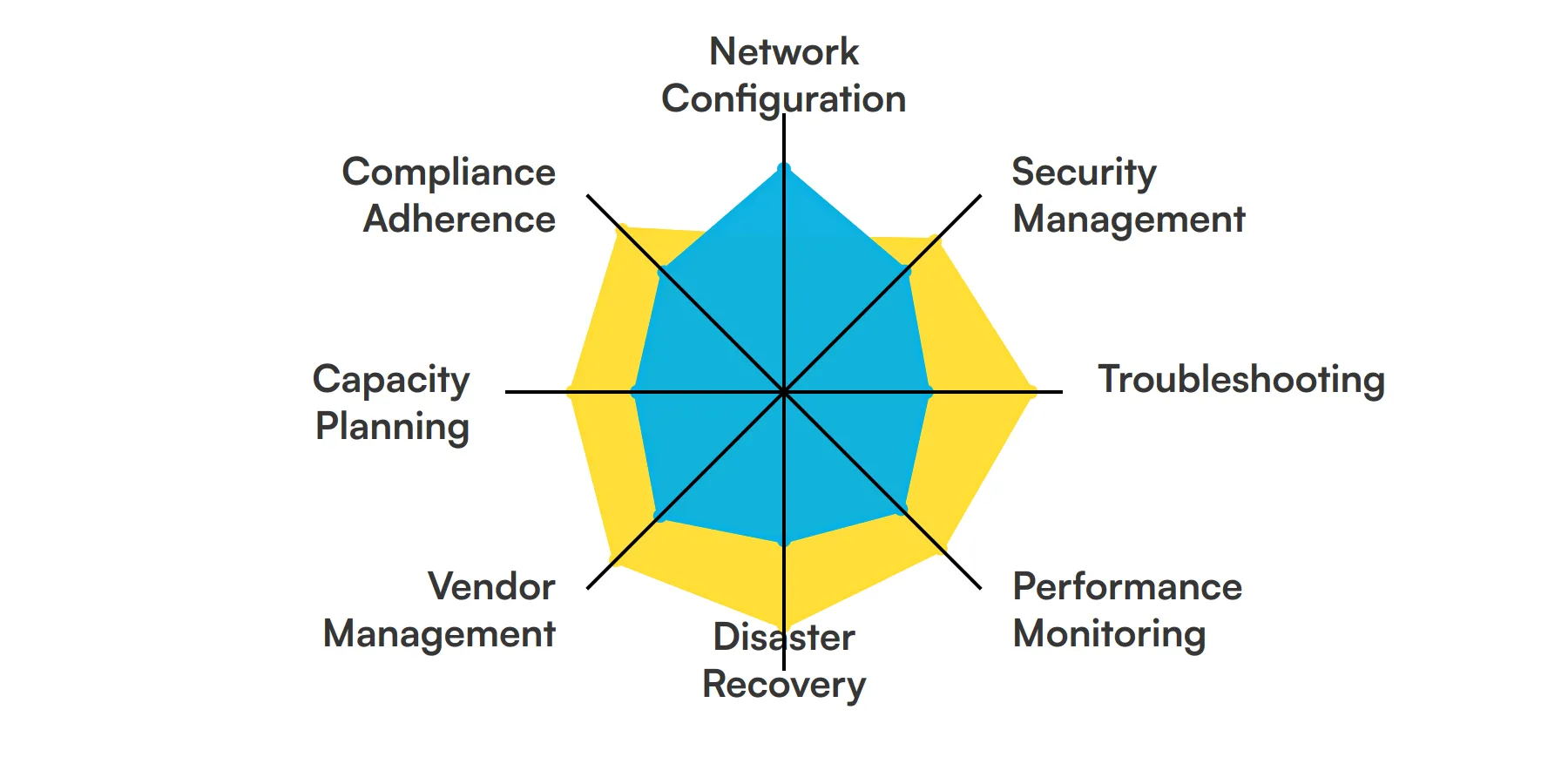
Network Configuration
Network Managers must be adept at configuring network hardware like routers, switches, and firewalls. This skill ensures that the network meets specific requirements and supports the organization's goals, facilitating efficient communication and data transfer across the network.
For more insights, check out our guide to writing a Network Engineer Job Description.
Security Management
A Network Manager is responsible for implementing security measures to protect data and manage network vulnerabilities. This includes setting up firewalls, intrusion detection systems, and regular security audits to prevent unauthorized access and data breaches.
Troubleshooting
The ability to quickly identify and resolve network issues is critical. Network Managers use this skill to ensure minimal downtime and maintain business continuity. They analyze performance issues and rectify them to keep the network running smoothly.
Check out our guide for a comprehensive list of interview questions.
Performance Monitoring
Monitoring network performance is key to preemptively identifying potential issues. Network Managers use various tools to track the health and efficiency of the network, optimizing operations and ensuring that performance benchmarks are met.
Disaster Recovery
Network Managers plan and implement disaster recovery strategies to restore hardware, applications, and data in case of a failure. This skill is crucial for maintaining the integrity and availability of network resources under all circumstances.
For more insights, check out our guide to writing a IT Director Job Description.
Vendor Management
Managing relationships with software and hardware vendors is essential for a Network Manager. This skill involves negotiating contracts, managing service level agreements, and ensuring that vendors meet their commitments to support the network infrastructure.
Capacity Planning
Network Managers must forecast future network needs and scale resources accordingly. This involves understanding the growth patterns of the organization and ensuring the network can handle increased traffic and data loads without performance degradation.
Compliance Adherence
Ensuring that the network complies with relevant laws and regulations is a key responsibility. Network Managers must be familiar with standards such as GDPR, HIPAA, or PCI-DSS, depending on the industry, to avoid legal and security issues.
8 secondary Network Manager skills and traits
The best skills for Network Managers include Technical Documentation, Project Management, Team Leadership, Budget Management, Cloud Services Management, Interpersonal Communication, Training and Development and Change Management.
Let’s dive into the details by examining the 8 secondary skills of a Network Manager.
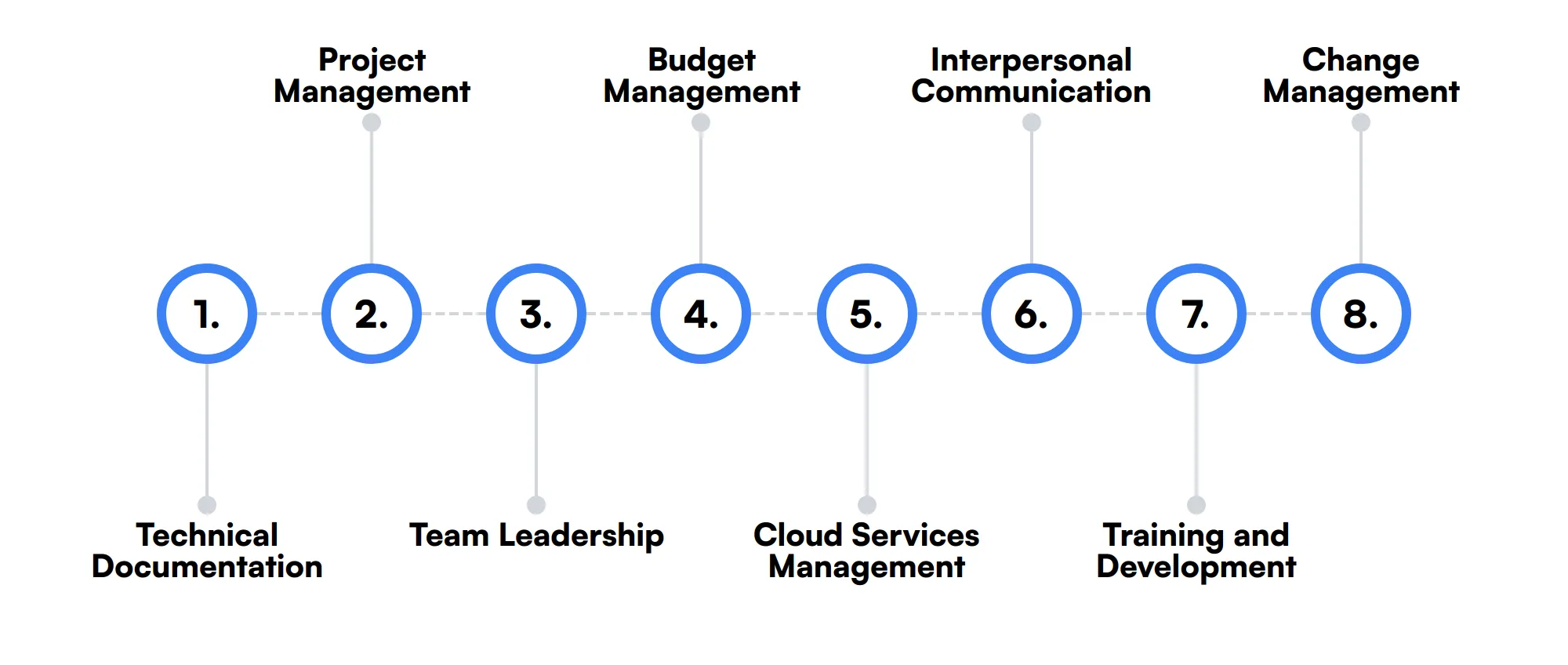
Technical Documentation
Creating and maintaining clear documentation is necessary for system configurations, network diagrams, and troubleshooting guides. This helps in maintaining consistency and aids in the quick resolution of issues.
Project Management
Network Managers often oversee projects to upgrade or expand network infrastructure. Skills in project management help in planning, executing, and closing projects efficiently, ensuring they meet the objectives within the designated time and budget.
Team Leadership
While not purely technical, the ability to lead and manage a team is important for a Network Manager who must often coordinate a group of IT professionals to achieve network goals and address issues collaboratively.
Budget Management
Network Managers are responsible for managing the budget allocated for network expenses. This includes cost analysis, forecasting, and ensuring that expenditures on network infrastructure and tools are within financial constraints.
Cloud Services Management
With many organizations moving to cloud-based solutions, understanding and managing cloud services and infrastructure is increasingly important for Network Managers.
Interpersonal Communication
Effective communication with team members, stakeholders, and vendors is crucial for Network Managers to convey technical information clearly and negotiate service agreements.
Training and Development
Network Managers often take on the role of training new staff and developing existing team members to ensure everyone is up-to-date with the latest network technologies and practices.
Change Management
The ability to manage and implement change within the network infrastructure without disrupting existing services is a valuable skill for Network Managers, especially in dynamic environments.
How to assess Network Manager skills and traits
Assessing the skills and traits of a Network Manager is a critical step in ensuring that your IT infrastructure is in capable hands. Network Managers play a key role in keeping an organization's network environment secure, efficient, and resilient. Understanding how to evaluate these skills effectively is key to making the right hiring decisions.
While resumes may highlight experience and certifications, they do not provide a clear picture of a candidate's hands-on capabilities in areas like network configuration, security management, and disaster recovery. This is where practical assessments come into play. By using skill-based assessments, you can measure a candidate's ability to handle real-world scenarios that they will face on the job.
Adaface assessments offer a tailored approach to evaluating the complex skill set required for Network Managers. These assessments cover a wide range of topics from performance monitoring to compliance adherence, helping you ensure that candidates not only meet the technical requirements but are also a good fit for your organization's specific needs. With Adaface, you can improve the quality of your hires and significantly reduce the time spent screening candidates.
Let’s look at how to assess Network Manager skills with these 4 talent assessments.
Network Engineer Online Test
Network Engineer Online Test evaluates candidates on their technical knowledge and practical skills related to computer networking. This includes network protocols, network architecture, network security, IP addressing, subnetting, routing, switching, WAN technologies, network troubleshooting, and network management.
The test assesses understanding of network protocols, network security, routing and switching, network troubleshooting, wireless networking, network design, network management, TCP/IP, LAN/WAN, and network performance optimization. Candidates navigate scenario-based multiple choice questions to demonstrate their proficiency in designing, implementing, and maintaining complex network infrastructures.
Successful candidates show proficiency in diagnosing and resolving network issues, ensuring robust communication and data transfer within modern organizations.
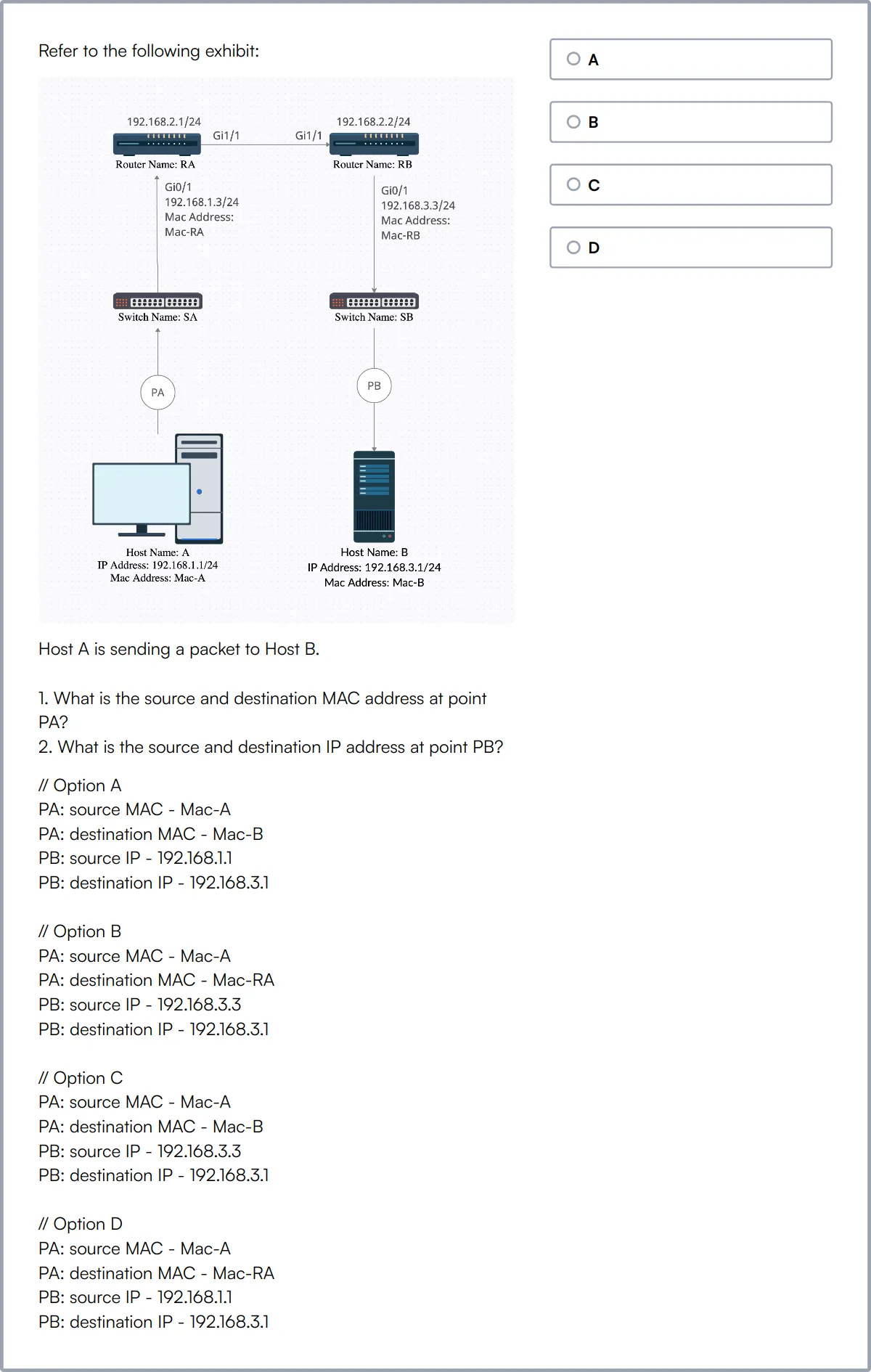
Cyber Security Assessment Test
Cyber Security Assessment Test evaluates candidates on their understanding of cybersecurity basics, including operating systems, computer networks, and cloud concepts. It also tests their ability to detect security risks, set up defenses, and use cryptography techniques.
The test covers network security, cybersecurity attacks, cryptography, web security, email security, malware, data security, data governance, cybersecurity defenses, risk assessments, and network tests. Candidates answer multiple choice questions to demonstrate their ability to identify and mitigate security threats.
High-scoring candidates are proficient in setting up guards against cyber attacks and using cryptography techniques to secure data.
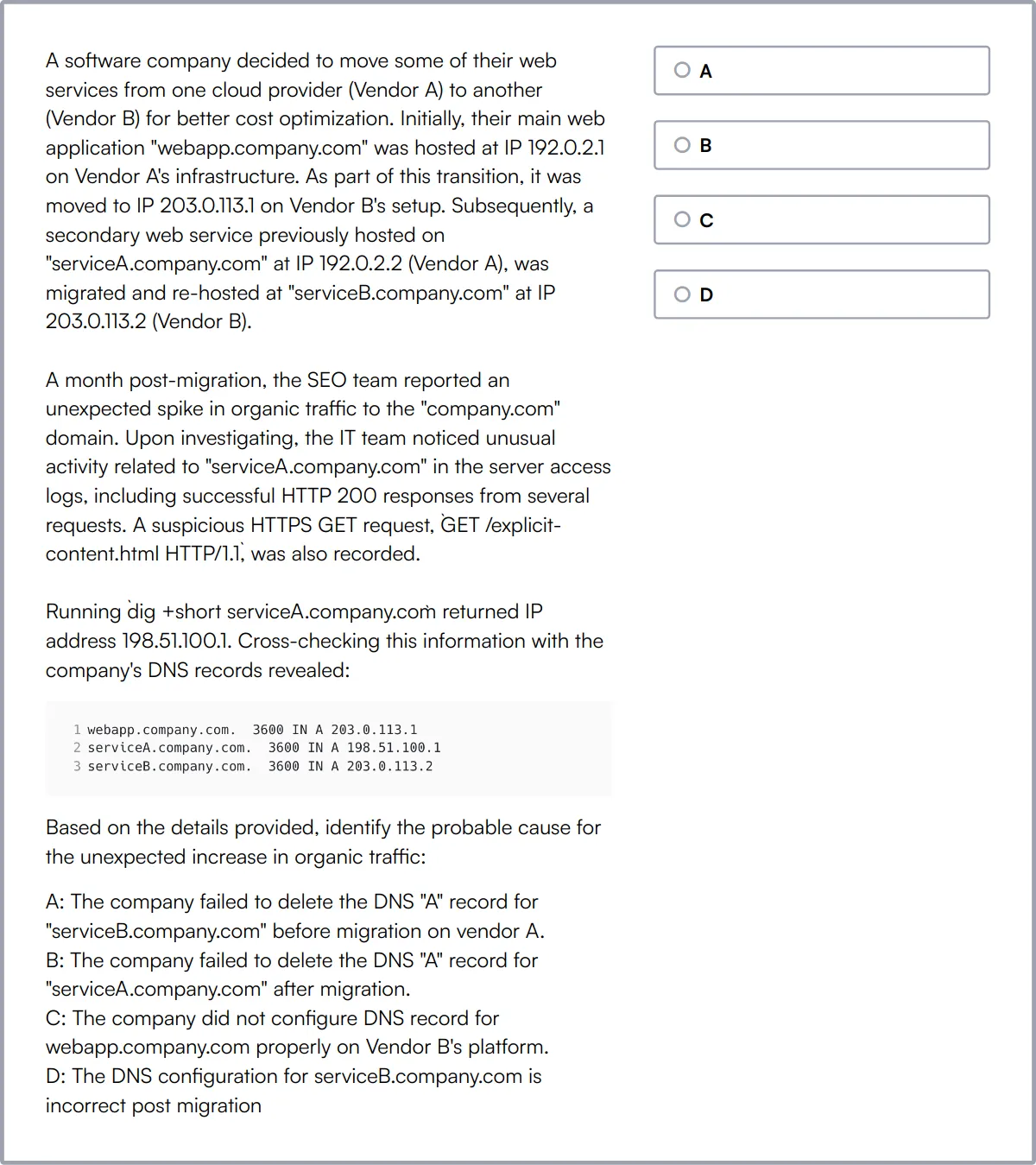
Technical Support Test
Technical Support Test assesses candidates' understanding of IT infrastructure, troubleshooting, and communication skills. It covers operating systems, networking, hardware and software support, and IT service protocols.
The test includes multiple choice questions and situational judgement questions to evaluate knowledge of operating system fundamentals, networking concepts, IT service protocols, database management, scripting languages, cybersecurity principles, incident reporting, communication skills, problem-solving, ITIL processes, data backup, cloud computing, user account management, and VPN/remote access.
Candidates who perform well demonstrate strong problem-solving abilities and customer service skills in real-world technical issues.
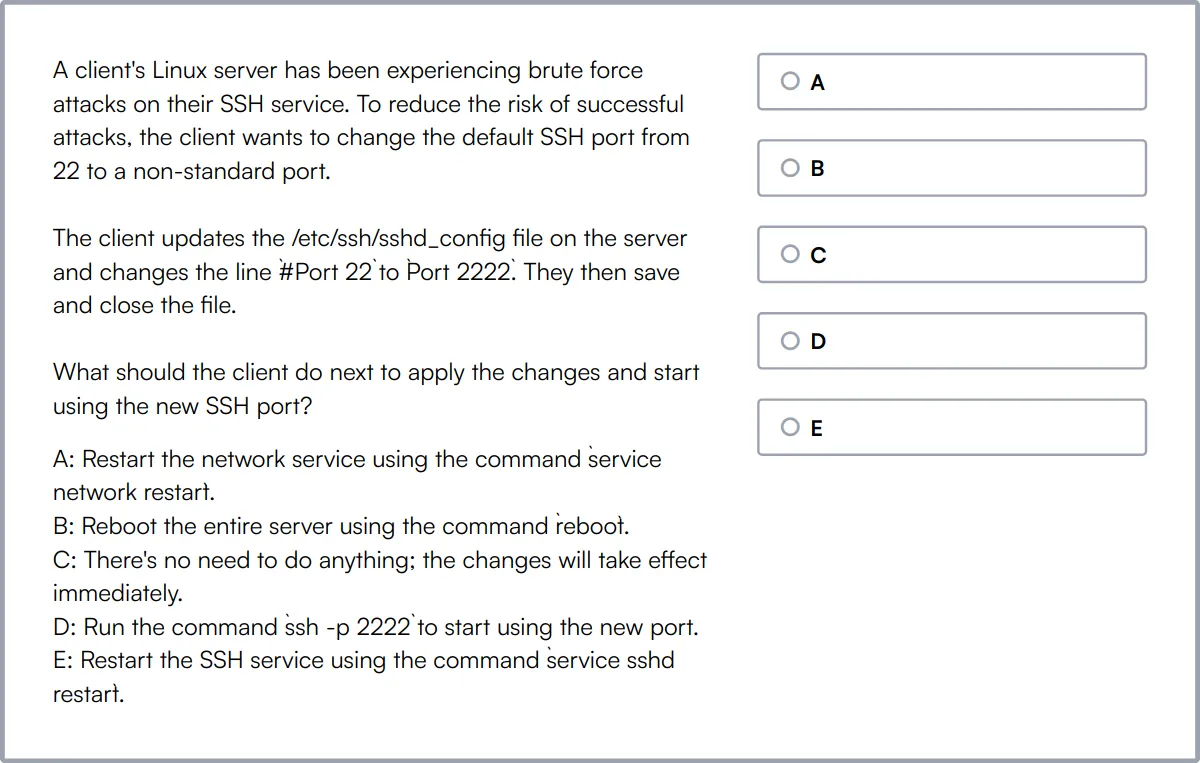
GDPR Online Test
GDPR Online Test evaluates candidates on their understanding of GDPR regulations and best practices for data protection and privacy. It assesses their ability to identify and evaluate data protection risks and develop GDPR compliance policies.
The test covers data privacy, data protection, data security, data breach, data processing, consent management, data retention, data subject rights, data transfer, data controllers, and data processors. Candidates answer scenario-based multiple choice questions to demonstrate their knowledge.
Successful candidates show proficiency in ensuring the security and privacy of personal data and implementing GDPR compliance policies.
Summary: The 8 key Network Manager skills and how to test for them
| Network Manager skill | How to assess them |
|---|---|
| 1. Network Configuration | Evaluate the ability to set up and manage network devices and services. |
| 2. Security Management | Assess skills in implementing and maintaining network security protocols. |
| 3. Troubleshooting | Check proficiency in diagnosing and resolving network issues. |
| 4. Performance Monitoring | Gauge capability in tracking and optimizing network performance. |
| 5. Disaster Recovery | Determine expertise in planning and executing recovery strategies. |
| 6. Vendor Management | Evaluate skills in coordinating with and managing external vendors. |
| 7. Capacity Planning | Assess ability to forecast and plan for network growth. |
| 8. Compliance Adherence | Check knowledge of and adherence to regulatory standards. |
Network Engineer Online Test
Network Manager skills FAQs
What are the key skills required for a Network Manager?
Network Managers need a blend of technical and managerial skills. Key areas include network configuration, security management, troubleshooting, performance monitoring, and disaster recovery. Additionally, skills in project management, team leadership, and budget management are important.
How can recruiters assess the troubleshooting skills of a Network Manager candidate?
Recruiters can assess troubleshooting skills by presenting candidates with hypothetical network issues and asking them to outline their approach to solving them. Behavioral interview questions about past troubleshooting experiences can also provide insights into their problem-solving abilities.
What is the importance of compliance adherence in a Network Manager role?
Compliance adherence ensures that network operations align with legal and regulatory requirements, helping prevent legal issues and potential security breaches. It's important for maintaining the integrity and reputation of the organization.
How does capacity planning impact the effectiveness of a network?
Capacity planning is critical for ensuring that a network can handle current and future data loads without performance degradation. It involves analyzing trends and predicting future needs to prevent network slowdowns and outages.
What strategies can Network Managers use for effective vendor management?
Effective vendor management strategies include clear communication of needs and expectations, regular performance evaluations, and maintaining strong relationships through consistent engagement. Negotiating skills and contract management are also key.
Why is technical documentation important in network management?
Technical documentation provides a detailed record of network configurations, procedures, and changes. It is essential for maintaining consistency in network operations, facilitating troubleshooting, and ensuring smooth handovers between team members.
How can Network Managers ensure effective team leadership?
Effective team leadership involves clear communication, setting realistic goals, providing regular feedback, and fostering a collaborative environment. Training and development opportunities are also crucial for team growth and motivation.
What role does change management play in network management?
Change management ensures that updates to network systems and processes are implemented smoothly and with minimal disruption. It involves planning, testing, and communicating changes to all stakeholders to maintain network stability and security.
Assess and hire the best Network Managers with Adaface
Assessing and finding the best Network Manager is quick and easy when you use talent assessments. You can check out our product tour, sign up for our free plan to see talent assessments in action or view the demo here:

40 min skill tests.
No trick questions.
Accurate shortlisting.
We make it easy for you to find the best candidates in your pipeline with a 40 min skills test.
Try for freeRelated posts
Free resources



